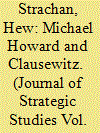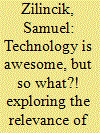| Srl | Item |
| 1 |
ID:
186088


|
|
|
|
|
| Summary/Abstract |
The English translation of Carl von Clausewitz’s On War by Michael Howard and Peter Paret has had a major impact on how Clausewitz is read today, especially in the United States and Britain. Howard in particular was determined to make Clausewitz doubly relevant – as one soldier speaking to other soldiers and as an author whose views on war had continuing purchase. However, the result is a text which, in reflecting the issues of its day, is not fully reflective of what Clausewitz himself said and has itself become dated.
|
|
|
|
|
|
|
|
|
|
|
|
|
|
|
|
| 2 |
ID:
186087


|
|
|
|
|
| Summary/Abstract |
In the early 1970s, Moscow and Washington had established a satellite verification regime to monitor arms control treaty compliance. Satellites had become a primary source of transparency and stability in superpower relations. Yet by the end of the 1970s, both the United States and the USSR were developing anti-satellite (ASAT) weapons that could destroy observation satellites. This article uses recently declassified archival documents to show that Jimmy Carter pushed for ASAT limits due to his broader arms control agenda, whereas Ronald Reagan rejected ASAT arms control primarily because of its potential impact on the Strategic Defense Initiative.
|
|
|
|
|
|
|
|
|
|
|
|
|
|
|
|
| 3 |
ID:
186086


|
|
|
|
|
| Summary/Abstract |
Following Moltke’s dictum that ‘no battle plan ever survives contact with the enemy’, military learning and adaptation has long been a staple of military studies. Over the past fifteen years, much of the literature has been focused on Western armed forces in Afghanistan and Iraq. Little attention has been paid thus far to adaptation by the Iraqi armed forces in their fight against ISIS. Whereas the Iraqi army was routed by the group in 2014, three years later it managed to take back almost all the territory lost to ISIS. How was that possible? This article discusses military adaptation by the Iraqi armed forces and their role in the military defeat of ISIS in Iraq. Combining an academic theoretical framework on military adaptation with a primary source-based investigation of the Iraqi fight against ISIS, we reconstruct how the Iraqi armed forces learned from their mistakes in 2014 and which role this process played in the military defeat of ISIS in Iraq.
|
|
|
|
|
|
|
|
|
|
|
|
|
|
|
|
| 4 |
ID:
186083


|
|
|
|
|
| Summary/Abstract |
Military theories are thoughts explaining how armed forces are to be used to achieve objectives. These thoughts are often influenced by emotions, yet the influence of emotions on military theory-crafting remains underexplored. This article fills the gap by exploring how awe influences military theorising. Awe is an emotion associated with the feeling of transcendence. Several military theorists felt that way about the technologies of air power, nuclear power and cyber power, respectively. Consequently, their theories became narrowly focused, technocentric and detached from the previous theories and military history. Understanding these tendencies can help improve military theorising in the future.
|
|
|
|
|
|
|
|
|
|
|
|
|
|
|
|
| 5 |
ID:
186084


|
|
|
|
|
| Summary/Abstract |
How does the urban environment, and the ethnic geography at its heart, influence the combat effectiveness of democracies conducting counterinsurgency operations? We argue that the city’s ethnic geography – whether it is ethnically homogenous, segregated, or mixed – influences combat effectiveness through two main mechanisms: intelligence and public opinion. There is no ‘ideal’ urban ethno-demographic setting where militaries are likely to be effective in combat. Rather, different ethno-geographies lead to different challenges with respect to intelligence and public opinion, which in turn affect combat effectiveness. We test our arguments through a structured focus comparison of the Troubles and the First Palestinian Intifada.
|
|
|
|
|
|
|
|
|
|
|
|
|
|
|
|
| 6 |
ID:
186085


|
|
|
|
|
| Summary/Abstract |
Conflict has urbanized because half the human population now lives in cities that offer insurgents the best protection from advanced weaponry. However, to understand the increased chance of inter-state urban warfare, it is necessary to consider a third factor: the reduction of force size. As a result of downsizing, state forces are no longer large enough to form fronts, as they did in the twentieth century. Consequently, even in inter-state wars, forces are also likely to converge on urban areas where the most important strategic, operational, and tactical objectives are located.
|
|
|
|
|
|
|
|
|
|
|
|
|
|
|
|